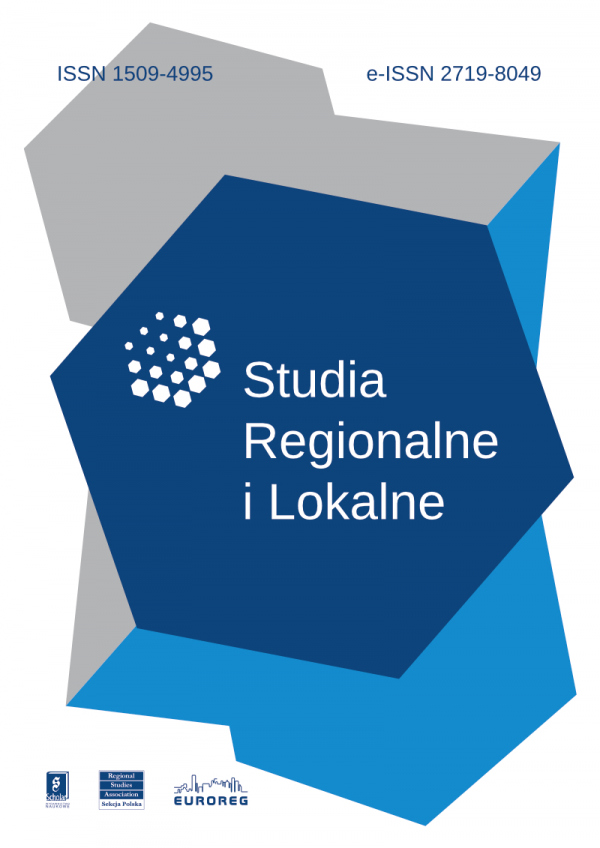Issue:
2(84)2021
Michał Niebylski
Partners without Partnership? Application of the Partnership Principle in the Process of Implementing Regional Operational Programmes in Poland in the 2014–2020 Financial Perspective
DOI: 10.7366/1509499528404
Partnerzy bez partnerstwa? Realizacja zasady partnerstwa w procesie wdrażania regionalnych programów operacyjnych w Polsce w perspektywie finansowej 2014–2020
Aktualizacja z dn. 25.07.2024: Fragmenty niniejszego artykułu w formie dosłownych cytatów bez podania źródła zostały wykorzystane w późniejszym artykule tego samego autora pt. "Realizacja zasady partnerstwa w procesie wdrażania regionalnych programów operacyjnych w Polsce" opublikowanym w numerze 3/2023 "Opinii i Komentarzy Fundacji Rozwoju Demokracji Lokalnej".
W niniejszym artykule podjęto próbę określenia stopnia realizacji zasady partnerstwa w procesie wdrażania regionalnych programów operacyjnych (RPO) w Polsce w obecnej perspektywie finansowej (2014–2020). Przyjęto założenie, że instytucjonalnym sposobem realizacji zasady partnerstwa jest powołanie i funkcjonowanie komitetów monitorujących (KM). Analizą porównawczą objęto praktyczne aspekty działania komitetów w ramach RPO w trzech województwach: lubuskim, świętokrzyskim i kujawsko-pomorskim. Do celów porównawczych wykorzystano następujące parametry instytucjonalno-organizacyjne: liczba posiedzeń komitetów w perspektywie finansowej 2014–2020, liczba przeprowadzonych procedur głosowania obiegowego, udział partnerów społeczno-gospodarczych w ogólnej liczbie członków KM, poziom frekwencji, poziom aktywności w dyskusjach w trakcie obrad komitetów, liczba grup roboczych w ramach KM, a także liczba spotkań grup roboczych. Hipoteza badawcza przyjęta w niniejszym artykule zakłada, że działania regulacyjne wyrażające się przygotowaniem wytycznych dotyczących stosowania zasady partnerstwa w ramach RPO w perspektywie finansowej 2014–2020 okazały się niewystarczające do tego, by wykształciły się w ramach RPO partnerstwa rozwinięte.
Partners without Partnership? Application of the Partnership Principle in the Process of Implementing Regional Operational Programmes in Poland in the 2014–2020 Financial Perspective
Update from 25/07/2024: Parts of this article in the form of literal quotes without providing the source were used in a subsequent article by the same author entitled "Implementation of the partnership principle in the process of implementing regional operational programs in Poland" published in "Opinie i Komentarze Fundacji Rozwoju Demokracji Lokalnej" 3/2023.
The aim of the paper is to examine the level of application of the partnership rule in the process of implementing regional operational programmes (ROP) in Poland in 2014–2019. It has been assumed that the Monitoring Committees (MC) operate as the institutional manifestation of the partnership principle. The scope of comparative analysis includes practical aspects of the functioning of MCs within ROPs in three voivodships: Kujawsko-Pomorskie, Lubuskie and Świętokrzyskie. The analysis focused on five institutional factors: number of Committee meetings in the financial perspective 2014–2020, number of circular voting events, percentage of socio-economic partners in the total number of Committee members, number of working groups within the MCs, as well as the number of meetings of working groups. The research hypothesis adopted in this article assumes that the regulatory activities expressed in the preparation of guidelines for the application of the partnership principle under the regional operational programs in the 2014–2020 financial perspective turned out to be insufficient for disseminating developed partnerships under ROPs.
Affiliation:
Michał Niebylski: Uniwersytet Opolski, Wydział Nauk o Polityce i Komunikacji Społecznej, Katedra Studiów Europejskich, ul. Katowicka 89, 45-061 Opole, Polska; ORCID: 0000-0003-1623-5886;
mniebylski@uni.opole.pl 


